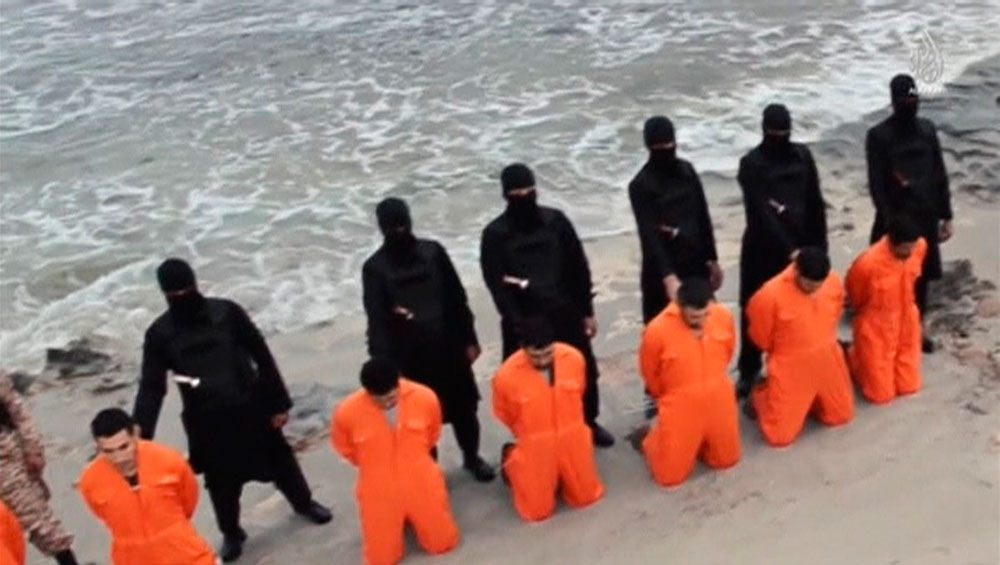By Larry Short
Thank you to everyone for the kind words and gracious support of Jason Comerford and me as we co-taught on Matthew 5:9, “Blessed are the peacemakers,” last Sunday.
I always feel, after preaching, like way more needed to be said about a specific passage than I actually had time and space to say. And I think I felt this more acutely last Sunday morning than I ever have before.

After the sermon a friend challenged my assertion that “peacemaking sometimes involves the use of force.” Now, I believe this is fundamentally true. Dropping atomic bombs on Hiroshima and Nagasaki was an incredibly violent act, but it brought a forceful end to a war that most historians believe would have dragged on for several more years, costing hundreds of thousands more Allied and possibly millions of Japanese lives in the process.
Jesus, the Ultimate Peacemaker, paid the ultimate price for peace between us and God. And that price was a violent death on the cross. The cost of true peace is sometimes very high.
At the very end of our time together, Sebastian asked what Jesus meant by His statement, “Do not suppose that I have come to bring peace to the earth. I have come not to bring peace, but a sword” (Matthew 10:34). Is this a justification for violence? Are Christians to wage crusades in order to propagate an enforced peace throughout the world? If the answer to this question is “Yes,” then how are we any different from fundamentalist Muslims who believe that sharia and the caliphate must be ushered in by acts of terrorist violence?
I think the answer to these difficult questions lies in the cross and the example of Christ as He approached it. We must understand that the cross was an incredibly violent and ultimately unjust act: sinful man crucifying an innocent and sinless God.
After He was arrested in the Garden of Gethsemane, seeing that Peter had pulled out a sword and was seeking violently to defend His Lord, Jesus instructed: “Put your sword back in its place, for all who draw the sword will die by the sword. Do you think I cannot call on my Father, and he will at once put at my disposal more than twelve legions of angels? But how then would the Scriptures be fulfilled that say it must happen in this way?” (Matthew 26:52-54)
Jesus said He had the power to call down at least “twelve legions” of angels … and in terms of the Roman Army, a legion was at least 6,000 soldiers, and often more. So 12 legions of angels would be at least 72,000 angels.
The question is, how powerful is one angel? One clue can be found in Isaiah 37:36.
Then the angel of the Lord went out and put to death a hundred and eighty-five thousand in the Assyrian camp. When the people got up the next morning—there were all the dead bodies!
You heard that right—one angel singlehandedly defeated 185,000 soldiers in one night. Doing a little math, therefore, shows you that 72,000 angels should be able to successfully take on an army of at least 13.33 billion soldiers!
No doubt this gave Christ a comfortable margin of error if He did indeed choose to fight that small handful of Roman soldiers rather than submit to the cross.
And I think that’s the whole point. Even though He had the power to defend Himself, Jesus willingly accepted the violence of the cross, both “for the joy set before Him” and because it was the will of His Father. True peacemaking is willing to pay the price!
Peacemakers don’t go out and take up a sword in order to forcefully institute some sort of kingdom of God on earth. Instead of taking up a sword, they take up a cross. They lay down their lives.
Armed with knives and guns, a group of ISIS terrorists marched a group of 21 Ethiopian Christian men out onto a beach in Libya in early 2015. They forced them to their knees, then beheaded them.
Who were the peacemakers in this scenario? Jesus told Peter, “Those who draw the sword will die by the sword.” Those 21 Christian martyrs entrusted their lives to Jesus.
I have a close friend, the husband of a coworker at World Vision, who was kidnapped by Communist rebels in Ethiopia when he was a young man in a Christian high school there. He and 89 other Christian students were lined up along a ditch, their hands tied behind their backs. Terrorists pointed machine guns at them and ordered them to recant their faith in Jesus. “Deny the name of Christ, and live,” they were told.
Eighty-one of the students recanted. My friend was one of nine who refused to do so.
Thank God it was a false threat. These young people were beaten and tortured, but not killed. Later, the government of Ethiopia, at the urging of the leadership of that Christian school, found and rescued alive those 90 students. Today my friend is an evangelist who preaches Christ to crowds in the tens of thousands in his homeland of Ethiopia. In obedience to the gospel, he was willing to lay down his life for the name of Christ, and Jesus chose to give it back to him to use as He saw fit.
Blessed are the peacemakers. My friend is one of the most blessed people I know.
How about us? Jesus may give us the power, the capacity, to defend ourselves against evil. Will we use it? Or will we choose to “take up our cross” and trust Him instead? That’s what true peacemakers do.
Views – 188

 Follow
Follow
